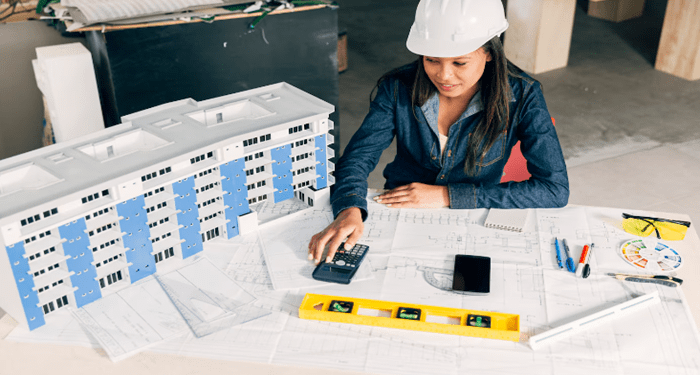Ensuring your concrete construction project is both timely and cost-effective is essential in today’s competitive landscape. By improving efficiency, you can minimize delays, cut costs, and boost overall productivity, making your project run smoother and more profitably. This article is designed to be your go-to guide, offering practical strategies tailored to the challenges you face in the field. From streamlining processes to optimizing resource management, our insights are here to help you overcome obstacles and achieve peak performance. Let’s explore how you can elevate your construction game and drive better outcomes for your projects.
Plan Thoroughly Before Starting
Anticipating challenges unique to concrete construction—such as managing fluctuating material strengths and curing times—makes thorough planning indispensable. Start by crafting a detailed project timeline that incorporates specific phases, from initial site preparation to final inspection. You must consider factors like potential weather shifts that could impact concrete pouring and curing schedules. Additionally, secure materials ahead of time, accounting for lead times to avoid delays. Being proactive in lining up essential resources ensures that no phase is stalled due to a lack of materials or equipment.
Equip your team with the necessary tools and knowledge by scheduling regular meetings to review the progress against your timeline, identifying any emerging issues early. Prioritize securing equipment like scaffolding rentals well in advance to avoid last-minute scrambles that could disrupt your schedule. Empower your workforce with high-quality training on efficient methods and safety practices to reduce errors and accidents, thereby maintaining momentum and safeguarding your team. By honing in on these specifics, you can create a concrete plan, literally and figuratively, that supports productivity and mitigates common construction delays.
Prioritize Communication Among Teams
Effective communication directly prevents costly delays by ensuring that no mix-up in concrete pour schedules or delivery times disrupts your project timeline. By prioritizing clear and consistent communication among teams, you can significantly reduce the risk of these common industry pitfalls. Implement project management software tailored to construction projects to provide real-time updates on tasks, schedules, and responsibilities. This level of detail keeps everyone informed and aligned, allowing you to anticipate and address potential issues before they become problems. Schedule daily or weekly check-ins where team members can voice concerns and offer feedback, ensuring that momentum is maintained and that all team members feel engaged and informed.
Additionally, establishing a clear line of communication with suppliers and subcontractors is just as critical. Make sure they are looped into your project management software and understand the timelines you’re working with. This synchronization enables you to react swiftly to any shifts in availability or timing, keeping your project on track. Encourage open dialogue and provide channels for instant communication, such as dedicated chat groups or mobile apps, so solutions can be devised on-the-fly if issues arise. By focusing on these detailed communication strategies, you secure a smoother workflow, facilitate effective teamwork, and enhance the overall success of your construction projects.
Rent Equipment Strategically
Ensuring the availability of the right equipment at the right time is paramount for concrete construction projects, where timing precision directly affects the strength and integrity of the structure. For your project, making informed choices about equipment rental can significantly streamline operations. Start by determining the specific needs of your project, such as the height and load requirements for scaffolding rentals necessary for different phases. Accurate planning in these areas prevents unnecessary delays and allows for a seamless workflow. Work closely with rental companies to coordinate delivery and pick-up schedules so that equipment arrives exactly when you need it, preventing idle time and optimizing site efficiency.
Consider negotiating flexible rental terms that accommodate potential shifts in your project timeline, a situation often inevitable in concrete construction due to weather conditions or supply chain disruptions. You should also think about insurance coverage for rented equipment, ensuring that you protect your investment in the event of damage or unexpected issues. Regular equipment inspections before and during usage can prevent unforeseen breakdowns that disrupt progress. By focusing on these strategies, you can manage resources more effectively, enhance your project’s timeline adherence, and ultimately improve profitability. This proactive and detailed approach to equipment rental helps guarantee that your construction projects move forward without costly interruptions.
Optimize Excavation Coordination
Excavation sets the foundation for every subsequent step in your concrete construction project, and any misstep can have cascading effects on both timelines and costs. You must ensure your plans include precise excavation details, as the accuracy of this phase dictates the ease of laying the essential groundwork for concrete pouring. Misaligned excavation work can lead to costly rework, affecting structural integrity and delaying project completion. To avoid these complications, collaborate closely with an excavation contractor such as Concrete Construction Excavating Inc, providing them with detailed site maps and plans. This ensures that their work aligns perfectly with your broader project goals, eliminating the need for later adjustments.
Regular collaboration is just as important in maintaining momentum. Arrange pre-construction meetings with your excavation team to discuss key deliverables and align on expectations. These discussions help prevent misunderstandings and ensure that work proceeds smoothly. Additionally, you should implement a robust communication channel, such as a project management app, to relay information updates in real-time. This proactive communication allows you to address any arising issues swiftly, thereby maintaining continuity and safeguarding your project timeline. By focusing on these strategies, you ensure that the critical early stages of your construction project are completed effectively, setting the stage for successful concrete pouring and further development.
Hire Specialized Services When Necessary
Overlooking specialized services during your concrete construction project can lead to significant challenges, particularly when specific amenities, such as septic facilities for your workforce, are involved. Partnering with commercial septic pumping services ensures that your workers have access to reliable sanitary facilities, which in turn supports health standards and boosts morale. These providers bring a depth of expertise in handling industry-specific demands that generic services may not address. Whether installing temporary or permanent septic systems, specialists can customize solutions that integrate seamlessly into your project design, ensuring compliance with environmental regulations and enhancing on-site productivity.
Beyond septic services, identifying and contracting other specialized services can safeguard the progression of your project. Water management systems, for instance, are critical in concrete construction, where improper drainage can compromise structural integrity and result in costly delays. By proactively engaging with experts who understand the nuances of site topography and regulatory requirements, you can implement systems that mitigate risks from the outset. This approach not only prevents expensive corrective measures post-construction but ensures a smoother workflow as your project advances. Embrace the expertise these specialized contractors bring, and you’ll likely see an improvement in project efficiency and overall outcomes.
Implement Efficient Material Management
Properly managing your materials directly decreases project costs and prevents delays specific to concrete construction, where factors like time-sensitive curing and precise mixing ratios are critical. Utilize a comprehensive inventory tracking system to monitor levels and restock materials accurately, as concrete requires timely and accurate material availability to maintain quality and safety standards. Opt for just-in-time delivery plans that synchronize with your project timeline, reducing the need to store surplus concrete, which can harden and become unusable. This approach allows your team to work efficiently without the clutter and complications of onsite excess, ensuring that each batch of concrete is fresh and suitable for use upon arrival.
To further refine your material management, regularly review supplier performance to ensure reliability and timeliness in deliveries. Engaging directly with suppliers for real-time updates on shipments can help preemptively address potential disruptions. Consider implementing digital tools like project management software to not only track material usage rates but also forecast future needs based on current construction progress. These systems can provide insights that help you identify patterns, adjust orders, and optimize procurement processes. By focusing on these tailored strategies, you boost your site’s operational efficiency and keep your concrete construction project on track and within budget.
Utilize Advanced Technology
Harnessing advanced technology in concrete construction revolutionizes both efficiency and accuracy, offering advantages that set your projects apart in today’s competitive market. Automated mixers, for instance, not only minimize human error during the mixing process but also ensure a consistent blend of concrete materials every time. This reliability in quality reduces waste and saves cost by preventing batch discrepancies, which could otherwise lead to structural weaknesses. Furthermore, deploying drones for site surveys allows for comprehensive assessments of large areas in a fraction of the time it would take traditional methods. With drones, you can capture precise data, enhancing your project’s planning stages by providing real-time insights into site topography and progression.
Investing in these technologies gives your business a competitive edge by addressing critical aspects of project management—time, cost, and quality. Automated systems enable you to allocate your workforce more effectively, freeing them from routine tasks and allowing them to focus on areas requiring specific expertise or manual oversight. This strategic deployment boosts overall productivity and aligns with modern demands for quick turnarounds without compromising on quality. Additionally, integrating digital tools that work in tandem with drones and automated mixers can offer a seamless workflow, allowing you to monitor progress, adjust as necessary, and maintain stringent control over every aspect of the build process. By embracing these technological innovations, you are not only securing consistent outcomes but also paving the way for future-proofing your operations in a rapidly evolving industry.
Schedule Overlapping Tasks Wisely
Timing precision can significantly enhance efficiency in concrete construction. When concrete is in the curing phase, it presents a unique opportunity to concurrently schedule non-intrusive tasks, such as installing plumbing systems or setting up electrical groundwork. This overlap means you can advance on multiple fronts without waiting for one operation to complete before the next begins, effectively accelerating your project timelines. As a project manager, identifying these windows between dependency-heavy tasks allows you to maximize site activity while maintaining structural integrity.
Avoid pitfalls that come with conflicting tasks by utilizing comprehensive project management software to map out your construction timeline meticulously. This tool can help you visualize and schedule activities at a detailed level, facilitating clear communication among teams about overlapping deadlines and potential points of intersection. Make use of project dashboards that track task status in real-time, ensuring you can swiftly resolve any conflicts that arise. By thoughtfully orchestrating these simultaneous activities, you maintain smooth workflow continuity and minimize the risk of delays, keeping your construction project both on schedule and within budget.
Focus on Workforce Training
Accidents on construction sites can critically disrupt your project timeline and escalate costs, making comprehensive workforce training indispensable in concrete construction. Establishing a rigorous safety program mitigates these risks by educating your team on routine protocols and emergency responses, ensuring every worker understands their role in maintaining a safe environment. Regular safety drills and workshops not only refresh knowledge but also adapt your team to evolving regulatory standards, which are crucial in minimizing workplace accidents. Additionally, emphasize practical training sessions that simulate job-specific tasks, such as proper handling of concrete mixers and adherence to correct site procedures, so that workers are continuously prepared for real-life scenarios.
Equipping your workforce with advanced skills and knowledge enhances productivity and quality in execution. By focusing on training modules that cover both foundational and cutting-edge techniques, such as the use of automated equipment or emerging concrete technologies, you empower your team to deliver superior results efficiently. Implementing a structured mentorship program also helps in retaining valuable talent by aligning new recruits with experienced professionals, fostering an environment where knowledge exchange flourishes. These efforts not only strengthen team cohesion and morale but also support your overarching business objectives by optimizing labor resources and reducing project timelines. Engage with your workforce through constructive feedback sessions, allowing them to contribute to process improvements and make informed decisions on-site, solidifying their commitment and aligning their individual goals with your company’s success.
Monitor Progress and Adapt Plans
Identifying potential hazards in real-time is a distinctive advantage of constant progress monitoring in concrete construction projects. This proactive scrutiny allows you to preemptively resolve issues such as resource shortages or timeline deviations before they escalate, ensuring steadfast adherence to project schedules. Implementing daily logs and detailed progress reports offers valuable insights into the project’s trajectory, helping you fine-tune resource allocation and manpower distribution to optimize workflow. By analyzing this data, you can identify trends and anticipate challenges, enabling you to make informed decisions about accelerating certain activities or postponing others to maintain project efficiency.
Moreover, adapting your plans based on real-time feedback equips you with the agility needed to respond effectively to unforeseen circumstances. Consider integrating advanced project management software that affords you a granular view of progress, along with predictive analytics to refine forecasts and strategic planning. Engaging with your team through regular meetings and feedback sessions encourages transparency and promotes collaborative problem-solving, ensuring everyone remains aligned with the project’s objectives. By maintaining a dynamic approach to project management, you safeguard your timelines, mitigate risks, and foster a responsive construction environment that thrives on adaptability and precision.
By incorporating these strategies into your concrete construction projects, you enhance operational efficiency, minimize risks, and ensure timely completion within budget constraints. Effective planning, communication, strategic equipment usage like scaffolding rentals, coordination with contractors like excavation services, material management, technology integration, task scheduling, employee training, and adaptive monitoring collectively contribute to streamlined processes that benefit all stakeholders involved in your construction endeavors.








